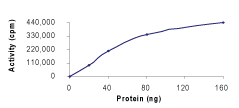
IGF1R, Active(I02-11H)
FOR BULK ORDER REQUESTS PLEASE CONTACT US
Description :Recombinant human IGF1R (960-end) was expressed by baculovirus in Sf9 insect cells using an N-terminal His tag.
Species :Human
Tag :HIS tag
Expression System:Sf9 insect cells using baculovirus
Sequence :960-end
Genbank Number :NM_000875
Specific Activity :Sample Kinase Activity Plot. For specific information on a given lot, see related technical data sheet.
Purity :Sample Purity Data. For specific information on a given lot, see related technical data sheet. 
Storage, Stability and Shipping :Store product at –70oC. For optimal storage, aliquot target into smaller quantities after centrifugation and store at recommended temperature. For most favorable performance, avoid repeated handling and multiple freeze/thaw cycles.
Applications :Kinase Assay, Western Blot
Molecular Weight :~53 kDa
Gene Aliases :CD221, IGFIR, JTK13, MGC142170, MGC142172
Scientific Background :IGF1R (Insulin-like Growth Factor 1) is a transmembrane tyrosine kinase receptor that is activated by IGF-1 and by the related growth factor IGF-2 (1). IGF1R mediates the effects of IGF-1 and plays an important role in growth and anabolic effects in adults. The IGF1R is implicated in several cancers, most notably breast cancer where it is highly overexpressed and functions as an anti-apoptotic agent by enhancing cell survival. In many instances, the anti-apoptotic properties of IGF1R overexpression allows cancerous cells to resist the cytotoxic properties of chemotheraputic drugs or radiotherapy (2).
References :
1. Yaghmaie F, et al:. "Tracking changes in hypothalamic IGF-1 sensitivity with aging and caloric restriction".. Experimental Gerontology, 2007; 42 (1-2): 148-149
2. Jones, H. et al (2004). "Insulin-like growth factor-I receptor signalling and acquired resistance to gefitinib (ZD1839; Iressa) in human breast and prostate cancer cells". Endocr. Relat. Cancer, 2004 11 (4): 793-814.
Product Sheets (By Lot #) :
Research Areas :Cancer, Metabolic Disorder, AKT/PKB Pathway, ERK/MAPK Pathway, Apoptosis/Autophagy, Cellular Stress, Angiogenesis, Receptor Tyrosine Kinases, Cancer, Metabolic Disorder, AKT/PKB Pathway, ERK/MAPK Pathway, Apoptosis/Autophagy, Cellular Stress, Angiogenesis, Receptor Tyrosine Kinases
